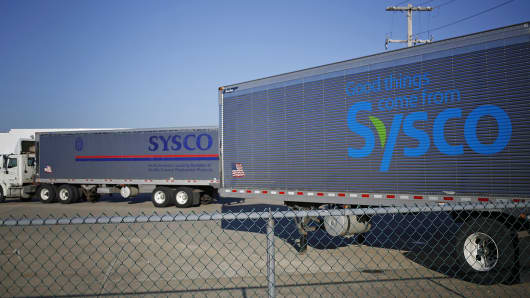This week, I took the stand in the U.S. District Court for the District of Columbia to fight for enhanced customer service, faster innovation, greater efficiency and lower costs in the U.S. food-service distribution industry. These are among the many procompetitive benefits that will result from the proposed merger of Sysco and US Foods, which the federal government is suing to block.
While creating shareholder value is obviously paramount for us, we achieve that goal by marketing and delivering great products to our customers with exceptional service. By merging with US Foods, we will generate at least $600 million in annual synergies and translate these cost savings into better prices, faster and more targeted service, and increased product innovation for customers.
Read MoreFake Avon takeover bid is a 'cautionary tale'
As a nation, our priority should be increasing the competitiveness of U.S. industry. This often requires mergers to produce economies of scale and scope. While the U.S. is the largest global economy, we are not the most competitive, ranking third on the World Economic Forum's competitiveness index. The most competitive countries do not put unnecessary roadblocks in front of efficiency-enhancing consolidation.
Innovation benefits both customers and consumers. At Sysco, we are proud of the innovative products we offer today and confident that the merger will enhance our innovation pipeline for tomorrow. As a combined company, we will have both greater means and greater scale to innovate. This is a competitive imperative, not a choice, for us.
More broadly, the ability to lower costs to restaurants, schools, and hospitals is good for America. The restaurants we deliver to are an important part of every local economy, from Raleigh to Rochester, providing jobs up and down the supply chain. According to the National Restaurant Association, restaurants employ one in 10 working Americans. Time wasted and higher costs can determine a restaurant's survival in a tough industry, especially for small, independent outlets, in an environment of slowing consumption and spending. The efficiencies and cost savings from this merger will help restaurants continue to thrive and generate jobs in their communities.
Read MoreOp-ed: 5 things we like about Verizon-AOL hookup
We respect the Federal Trade Commission and their mission to protect competition, but they missed the mark in challenging our merger. As we are currently demonstrating in court, the food-service market is very competitive, with more than 16,000 distribution companies competing vigorously state-by-state, city-by-city and street-by-street. It's impossible to dominate this sprawling industry, but we can make it more competitive by introducing better prices and more efficient services, and keeping our numerous competitors on their toes. That's what we intend to do.
With any merger, there are uncertainties. But faster and more effective service to our customers, better prices, and more innovation are not among them. This merger is consistent with our long-standing commitment to be our customers' most valued and trusted business partner.
With this merger, we will better serve Americans and make our industry more competitive globally. And that's something we can all break bread over.
Commentary by Bill DeLaney is president and CEO of Sysco Corporation. He began his Sysco career in 1987 at Sysco's corporate headquarters in Houston. Bill also serves on the board of directors of Express Scripts Inc., The Center for Houston's Future and the Greater Houston Partnership. Follow Sysco on Twitter @Sysco.


